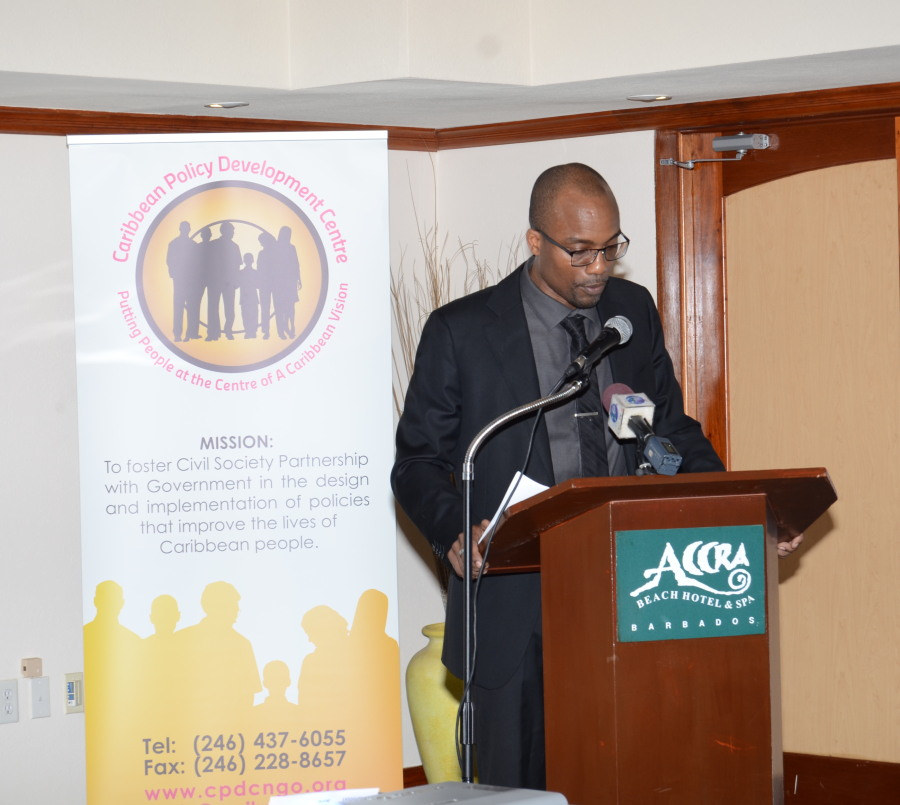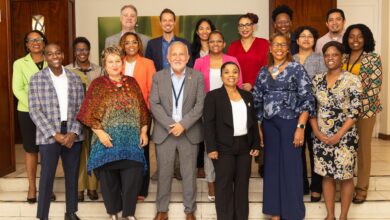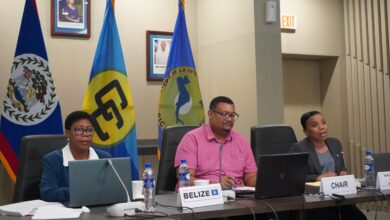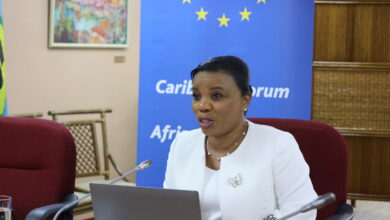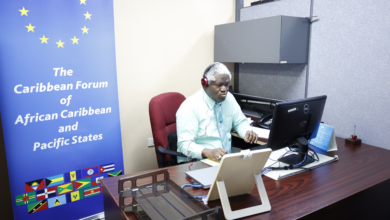– Mr. Remwick Rose, Chairman of the CARIFORUM Representatives of Civil Society;
– Ambassador Mikael Barfod, Head of the EU Delegation to Barbados and the Eastern Caribbean;
– Distinguished Ladies and Gentlemen
On behalf of the Director-General of the CARIFORUM Directorate, Mr. Percival Marie, I would like to thank CARIFORUM Civil Society for inviting the CARIFORUM Directorate to this important event. Unfortunately, Mr. Marie is unable to attend this Meeting, but he extends his best wishes for a fruitful engagement.
I would also like to take this opportunity to wish you a Happy and Productive 2016.
The CARIFORUM Directorate is indeed very pleased to be participating in this Meeting, at the invitation of the CARIFORUM Chair of the CARIFORUM-EU Consultative Committee. We have enjoyed a cordial relationship with the Chair and his team, and we are happy to serve as resource persons for a number of the items on the agenda of this Meeting.
In my brief remarks this morning, I want to touch on three themes.
1. The role of civil society in EPA implementation;
2. The Five Year Review of the EPA and the 10th & 11th EDF CRIP programmes; and
3. Our commitment to inclusivity regarding incorporating civil society 'voices' in EPA implementation.
With respect to the role of Civil Society in EPA Implementation, as you are all aware, the Consultative Committee is intended to formally afford civil society a platform to add their voice to the implementation of the EPA.
Article 232 of the EPA establishes the Consultative Committee which is tasked with “assisting the Joint CARIFORUM-EU Council to promote dialogue and cooperation between representatives of organizations of civil society. This dialogue and cooperation
is meant to encompass all economic, social and environmental aspects of the relations between the EU and CARIFORUM States, within the context of the implementation of this Agreement.”
Of note, this Committee is charged with making recommendations to the Joint CARIFORUM-EU Council and the CARIFORUM-EU Trade and Development Committee.
This Preparatory Meeting is taking place some 15 months following the historic inaugural meeting of the Consultative Committee, which marked the culmination of a long road to give effect to the said Committee.
Ladies and Gentlemen, all indications are that civil society took full advantage of the inaugural meeting of the Consultative Committee.
One needs look no further than the statement issued following the conclusion of that Meeting to appreciate the significance of civil society's contribution. The statement is a testament to this constituency's very good command of the issues and the fresh insights that you bring to the process.
In this regard (and now I address my second point), we are especially grateful for your contribution to the first Five Year Review of the EPA, the basis for which is set out in the Declaration on the Signing of the Agreement.
When the Joint CARIFORUM-EU Council held its Third Meeting on 16 July 2015 it provided the opportunity for the Ministers of CARIFORUM States and high level representation from the European Union to assess what progress has been made with respect to the implementation of the Agreement. We look forward to providing Civil Society with a report of the Review exercise during the course of the next two days.
That said, it is worth noting that one major finding of this Review is that there are operational and capacity issues which continue to constrain CARIFORUM States in honouring obligations and deriving benefits under the Agreement.
The core of the matter is that CARIFORUM States have not yet been able to convert the market access available under the Agreement to market presence and there is need to pay close attention to their institutional capacity, promoting trade and investment as
well as CARIFORUM’s supply side capacity constraints in order to realize the full benefits of the EPA.
Some 10th EDF programmes have been geared toward addressing the aforementioned constraints, and more assistance in this regard is expected to continue to be channelled to the Region under the 11th EDF CRIP which, as you are perhaps aware, was signed in June 2015. I take this opportunity to express our gratitude to the EU, which has been a reliable partner in providing support to CARIFORUM States to take advantage of this Agreement.
As a matter of course, then, we will also be providing you with an update as to the state of play regarding these two funding programmes. In this context, particular focus will be on the 11th EDF CRIP, which amounts to EUR 346 mil. We will take stock of the fact that negotiations in this regard have been marked by wider considerations, namely, the ongoing debate on the future of ACP-EU relations in the post-Cotonou era.
Ladies and Gentlemen, I want to end my remarks by reaffirming our commitment to the involvement of civil society in EPA implementation.
Our partnership with you is a vital link for us to better understand how the citizens of CARIFORUM States are benefitting from the EPA, but also the challenges that obtain in the roll-out of the Agreement.
We are, therefore, committed to ensuring that civil society is integrally involved in shaping outcomes in respect of EPA implementation, which will ultimately have a bearing on this constituency.
Ladies and Gentlemen, I conclude by commending CPDC and by extension the CARIFORUM Civil Society Representatives for convening this second preparatory meeting and I invite you to take full advantage of my colleagues’ presence here to assist you in further solidifying your role and strengthening your voice in EPA implementation.
Thank you for your consideration and I wish you a successful Meeting.

